Summer can be a time for rest, but for teachers, it’s also a perfect opportunity for reflection and professional development.
For those looking to digest new information and plan for the coming school year, we present both physical books you can request and check out as well as eBooks that are accessible from the comfort of your home.
eBooks
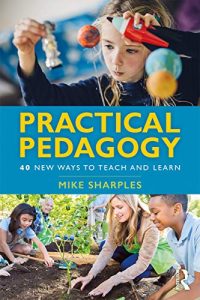 Practical pedagogy: 40 new ways to teach and learn (1st ed.).
Practical pedagogy: 40 new ways to teach and learn (1st ed.).
Sharples, & Mike. (2019).
Practical Pedagogy expands the universe of teaching and learning. It provides an accessible guide to new and emerging innovations in education, with insights into how to become more effective as a teacher and learner.
New teachers will find a comprehensive introduction to innovative ways of teaching and learning. Experienced educators will be surprised by the range of useful pedagogies, such as translanguaging, crossover learning, teachback, bricolage and rhizomatic learning.
Policy makers will gain evidence of how new teaching methods work in practice, with resources for curriculum design and course development.
–
 What great teachers do differently: Nineteen things that matter most.
What great teachers do differently: Nineteen things that matter most.
Whitaker, T. (2020).
What are the beliefs and behaviors that set great teachers apart? In this internationally renowned bestseller, Todd Whitaker reveals 19 keys to becoming more effective in the classroom.
This essential third edition features new sections on why it’s about more than relationships, how to focus on a consistent, engaging learning environment, and the importance of choosing the right mode—business, parent, child—to improve your classroom management.
Perfect for educators at any level of experience, for independent reading or for schoolwide book studies, this practical book will leave you feeling inspired and ready to do the things that matter most for the people who matter most—your students.
–
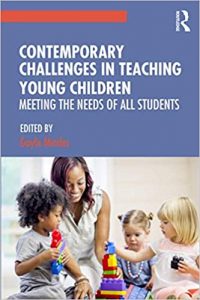 Contemporary challenges in teaching young children: Meeting the needs of all students.
Contemporary challenges in teaching young children: Meeting the needs of all students.
Mindes, G. (2020).
Contemporary Challenges in Teaching Young Children provides both veteran and aspiring early childhood educators with the information and tools they need to build on their understanding of developmentally appropriate practice.
Teachers face many challenges, including family configuration, social and political stressors related to accountability requirements, funding shortages, and the resulting need to teach with fewer resources. This innovative book focuses exclusively on problem-solving at the classroom level and fosters creative methods of ensuring best practices are in place for all children, including those with limited experience in formal social settings and a lack of self-regulatory behaviors. Drawing on current research and their own wealth of experience, expert contributors cover topics from the critical importance of social-emotional learning to culturally responsive teaching to using technology to empower teachers and learners.
Written in accessible, non-technical language, this book addresses complex factors affecting child development, guiding readers through the best strategies for tackling real problems in their practice.
–
 The elements of education for teachers: 50 research-based principles every educator should know (1st ed.).
The elements of education for teachers: 50 research-based principles every educator should know (1st ed.).
Volz, Austin, Higdon, Julia, Lidwell, & William. (2019).
What makes some teachers more effective than others? What pedagogies and practices are fads and which are backed with quality evidence? Which teaching strategies give teachers the biggest learning bang for their buck?
The authors have surveyed the research literature and carefully curated 50 elements of effective teaching—elements such as direct instruction, executive functions, metacognition, motivation, and scaffolding—to answer such questions and demystify the secrets of master teachers.
Designed specifically for clarity and ease of use, this book is perfect for both new and experienced educators. Each element uses a consistent architecture: a simple definition, concise overview of the research, practical Dos and Don’ts for the classroom, and a select quote to inspire reflection.
The Elements of Education for Teachers is an essential addition to any teacher’s library and important reading for teachers’ professional development.
–
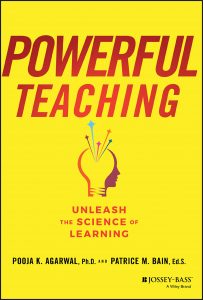 Powerful Teaching: Unleash the science of learning (First ed.).
Powerful Teaching: Unleash the science of learning (First ed.).
Agarwal, P. K., Bain, P. M., & Wiley (2019).
Powerful Teaching: Unleash the Science of Learning empowers educators to harness rigorous research on how students learn and unleash it in their classrooms. In this book, cognitive scientist Pooja K. Agarwal, Ph.D., and veteran K–12 teacher Patrice M. Bain, Ed.S., decipher cognitive science research and illustrate ways to successfully apply the science of learning in classrooms settings. This practical resource is filled with evidence-based strategies that are easily implemented in less than a minute—without additional prepping, grading, or funding!
Research demonstrates that these powerful strategies raise student achievement by a letter grade or more; boost learning for diverse students, grade levels, and subject areas; and enhance students’ higher order learning and transfer of knowledge beyond the classroom. Drawing on a fifteen-year scientist-teacher collaboration, more than 100 years of research on learning, and rich experiences from educators in K–12 and higher education, the authors present highly accessible step-by-step guidance on how to transform teaching with four essential strategies: Retrieval practice, spacing, interleaving, and feedback-driven metacognition.
With Powerful Teaching, you will:
- Develop a deep understanding of powerful teaching strategies based on the science of learning
- Gain insight from real-world examples of how evidence-based strategies are being implemented in a variety of academic settings
- Think critically about your current teaching practices from a research-based perspective
- Develop tools to share the science of learning with students and parents, ensuring success inside and outside the classroom
Powerful Teaching: Unleash the Science of Learning is an indispensable resource for educators who want to take their instruction to the next level. Equipped with scientific knowledge and evidence-based tools, turn your teaching into powerful teaching and unleash student learning in your classroom.
–
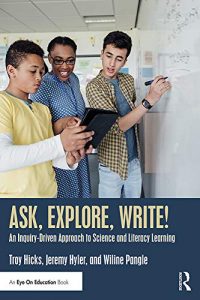 Ask, explore, write: An inquiry-driven approach to science and literacy learning (1st ed.).
Ask, explore, write: An inquiry-driven approach to science and literacy learning (1st ed.).
Hicks, T., Hyler, J., & Pangle, W. (2020).
Discover how to effectively incorporate literacy instruction into your middle or high school science classroom with this practical book. You’ll find creative, inquiry-based tools to show you what it means to teach science with and through writing, and strategies to help your students become young scientists who can use reading and writing to better understand their world.
Troy Hicks, Jeremy Hyler, and Wiline Pangle share helpful examples of lessons and samples of students’ work, as well as innovative strategies you can use to improve students’ abilities to read and write various types of scientific nonfiction, including argument essays, informational pieces, infographics, and more. As all three authors come to the work of science and literacy from different perspectives and backgrounds, the book offers unique and wide-ranging experiences that will inspire you and offer you insights into many aspects of the classroom, including when, why, and how reading and writing can work in the science lesson.
–
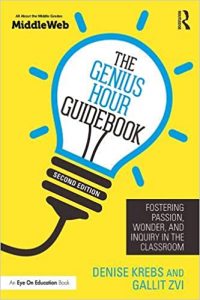 The genius hour guidebook: Fostering passion, wonder, and inquiry in the classroom (Second ed.).
The genius hour guidebook: Fostering passion, wonder, and inquiry in the classroom (Second ed.).
Krebs, D., Zvi, G., & Taylor & Francis (2020).
Promote your students’ creativity and get them excited about learning! In the second edition of this popular, practical book, authors Denise Krebs and Gallit Zvi show you how to implement Genius Hour, a time when students can develop their own inquiry-based projects around their passions and take ownership of their work. Brought to you by MiddleWeb and Routledge Eye On Education, the book takes you step-by-step through planning and teaching Genius Hour. You’ll learn how to guide your students as they:
● inspire learning and brainstorm wonders;
● develop inquiry questions based on their interests;
● conduct research and experiments about their topic of choice;
● create presentations to teach their fellow students in creative ways; and
● present their finished product for a final assessment.
This edition includes new chapters on managing your classroom projects and recommended books. Throughout the book you will find voices from the Genius Hour community sharing real-life stories and inspiration.
–
Physical Books
 We got this.: equity, access, and the quest to be who our students need us to be.
We got this.: equity, access, and the quest to be who our students need us to be.
Cornelius Minor; foreword by Kwame Alexander.
LB1025.3 .M576 2019
“That’s the problem with you, Minor” a student huffed. “You want to make everything about reading or math. It’s not always about that. At school, you guys do everything except listen to me. Y’all want to use your essays and vocabulary words to save my future, but none of y’all know anything about saving my now.”
In We Got This Cornelius Minor describes how this conversation moved him toward realizing that listening to children is one of the most powerful things a teacher can do. By listening carefully, Cornelius discovered something that kids find themselves having to communicate far too often. That “my lessons were not, at all, linked to that student’s reality.”
While challenging the teacher as hero trope, We Got This shows how authentically listening to kids is the closest thing to a superpower that we have. What we hear can spark action that allows us to make powerful moves toward equity by broadening access to learning for all children. A lone teacher can’t eliminate inequity, but Cornelius demonstrates that a lone teacher can confront the scholastic manifestations of racism, sexism, ableism and classism by showing:
- exactly how he plans and revises lessons to ensure access and equity
- ways to look anew at explicit and tacit rules that consistently affect groups of students unequally
- suggestions for leaning into classroom community when it feels like the kids are against you
- ideas for using universal design that make curriculum relevant and accessible
- advocacy strategies for making classroom and schoolwide changes that expand access to opportunity to your students
–
 What is a “good” teacher?
What is a “good” teacher?
David Booth, Richard Coles.
LB1025.3 .B6548 2017
Based on the experiences of teachers who make a difference, this book offers valuable insights into becoming the best teacher you can be for your students.
Grounded in the latest research, you will find real-life examples of professional excellence in practice. Beginning with developing your teacher identity and getting to know your students, the book goes on to show you how to implement effective strategies and techniques in your classroom and gain a better understanding of how effective schools work.
–
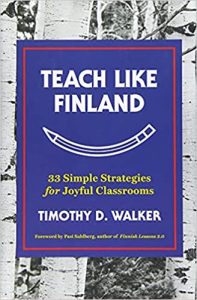 Teach like Finland: 33 simple strategies for joyful classrooms.
Teach like Finland: 33 simple strategies for joyful classrooms.
Timothy D. Walker ; foreword by Pasi Sahlberg.
LB1065 .W282 2017
Easy-to-implement classroom lessons from the world’s premier educational system.
Finland shocked the world when its fifteen-year-olds scored highest on the first Programme for International Student Assessment (PISA), a set of tests touted for evaluating critical-thinking skills in math, science, and reading. That was in 2001; but even today, this tiny Nordic nation continues to amaze. How does Finnish education—with short school days, light homework loads, and little standardized testing—produce students who match the PISA scores of high-powered, stressed-out kids in Asia?
When Timothy D. Walker started teaching fifth graders at a Helsinki public school, he began a search for the secrets behind the successes of Finland’s schools. Walker wrote about several of those discoveries, and his Atlantic articles on this subject became hot topics of conversation. Here, he gathers all he learned and reveals how any teacher can implement many of Finland’s best practices.
Remarkably, Finland is prioritizing the joy of learning in its newest core curricula and Walker carefully highlights specific strategies that support joyful K-12 classrooms and integrate seamlessly with educational standards in the United States.
From incorporating brain breaks to offering a peaceful learning environment, this book pulls back the curtain on the joyful teaching practices of the world’s most lauded school system. His message is simple but profound: these Finland-inspired strategies can be used in the U.S. and other countries. No educator—or parent of a school-aged child—will want to miss out on the message of joy and change conveyed in this book.
–
 Teaching for mastery.
Teaching for mastery.
Mark McCourt.
LB1025.3 .M347 2019
There are many models of schooling; some work, some don’t. Mastery is an entire model of schooling with over 100 years of provenance, its impact has been researched for decades, with many of the world’s greatest education minds testing and refining the approach. It’s one of the models of schooling that actually works.
In this book, Mark McCourt examines the history of a teaching for mastery approach, from its early beginnings to the modern day when cognitive scientists have been able to bring further evidence to the debate, demonstrating why a model that was first proposed in the 1910s has the incredible impact on both pupil attainment and attitudes to learning that it has had all around the world over many decades.
Drawing on examples from cross disciplines, the story of mastery is one that all educators can engage with. Mark also draws on his own subject, mathematics, to further exemplify the approach and to give practical examples of pedagogies and didactics that teachers can deploy immediately in their own classroom.
–
 The happy teacher habits: 11 habits of the happiest, most effective teachers on earth.
The happy teacher habits: 11 habits of the happiest, most effective teachers on earth.
Michael Linsin.
LB1025.3 .L5627 2016 Great Reads
What do daffodils, baseball announcing, and Tina Fey have to do with teaching? As it turns out, a lot. In The Happy Teacher Habits, Michael Linsin guides you through 11 little-known habits of the happiest, most effective teachers on Earth.
Based on the latest research, and drawing on experts from the worlds of business, marketing, sports, entertainment, music, and medicine, you will learn simple, actionable strategies that will eliminate your teaching stress, supercharge your ability to motivate and inspire your students, and empower you to really love your job.
This is no ordinary teaching book. It is a success roadmap through an educational system that is becoming increasingly harder to navigate. It will expose the falsehoods and misinformation teachers are bombarded with every day, and reveal the secrets to what really matters in creating a happy and fulfilling career.
–
 Success for every student: a guide to teaching and learning.
Success for every student: a guide to teaching and learning.
Shelly Pollnow and Oran Tkatchov.
LB1025.3 .P65 2017
Success for Every Student: A Guide to Teaching and Learning contains research and evidence based classroom practices that maximize learning for all students. Throughout the book the authors deliver a common sense approach to proven teaching strategies that help learners reach their potential. Ultimately, it is the teacher behaviors that have the greatest impact on student behaviors.
Success for Every Student is packed full of tools and tips in everything from classroom management to formative assessment that give busy teachers what they need to become more efficient and effective professionals in their classrooms and schools. At the end of each chapter are real life scenarios for readers to reflect and think about what they would do given the situation. As a bonus, the book has a companion website that provides more tools and covers current topics in the education news.
This practical book provides sound suggestions and guidance to help create a culture of learning in classrooms and schools where high expectations are the norm and there is an opportunity of success for every student.